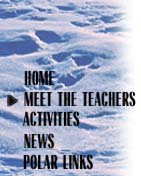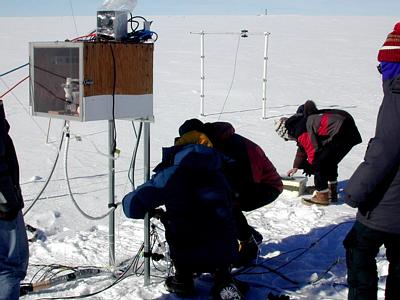
|
|
6 June, 2000
I awakened at 4:30 am - ridiculous time to be awake. But then I noticed I
was wet with perspiration. I jettisoned the insulated Nalgene bottle of hot
water used to maintain heat within the sleeping bag and went back to sleep.
At a more reasonable waking hour, I realized that the temperature within
the tent was not so shockingly cold as usual. A beautiful calm, sunny day -
only -13 C with low wind- was in store the whole day. Interesting how such
a cold temperature is all of a sudden quite reasonable and nice. No
sundogs, or diamond dust, just clear blue skies and sparkling snow.
Today I began learning about the procedures that Dr. Jack Dibb and his
graduate assistant, Matthew Arsenault use to study organic and inorganic
compounds in the air just above and in the pore spaces (firn) of the snow.
A push of a button, a whir within the 'magic box,' and a sample was taken
in. Suddenly a graph began to appear on the computer with a variety of
peaks. The instrument is an Ion Chromatograph (IC) and it works on
conductivity of the ionic substances that Dr. Dibb wants to study. A
chromatograph separates substances out by charge and molecule size. Many
repetitions of samples are taken to try to determine the amounts of
nitrate, nitrite, sulfate, and bromide, as well as formate and acetate
present. (Don't worry-there is no test at the end of this =).) It is too
soon to have even preliminary comparisons, but right now I'm enjoying
learning about the process.
Today the various researchers were also testing the uptake and release of
different compounds in a controlled snow chamber. The snow chamber they
used was a quartz tube 10cm in diameter and 1 meter long. By the time they
had gotten through putting on all the monitoring devices, it looked
positively fuzzy. The air passing through the snow was monitored under
different light conditions, and with a piece of plexiglass, which blocks UV
rays, so they could determine what causes the appearance of the different
compounds.
Warm regards,
Besse Dawson

> Researchers taking data from the snow chamber. It's like a feeding > frenzy! > > > > > > <>

Contact the TEA in the field at
.
If you cannot connect through your browser, copy the
TEA's e-mail address in the "To:" line of
your favorite e-mail package.
|
